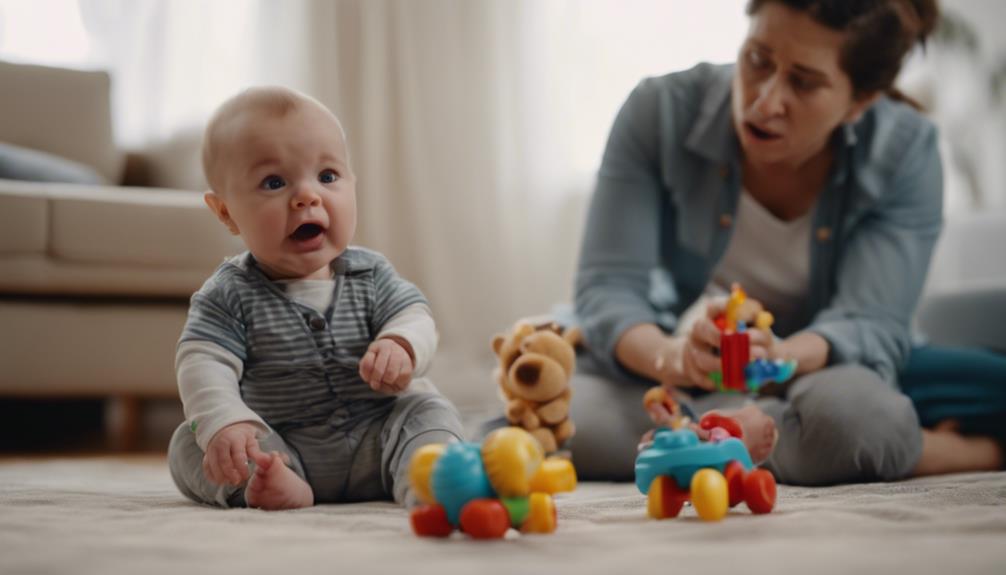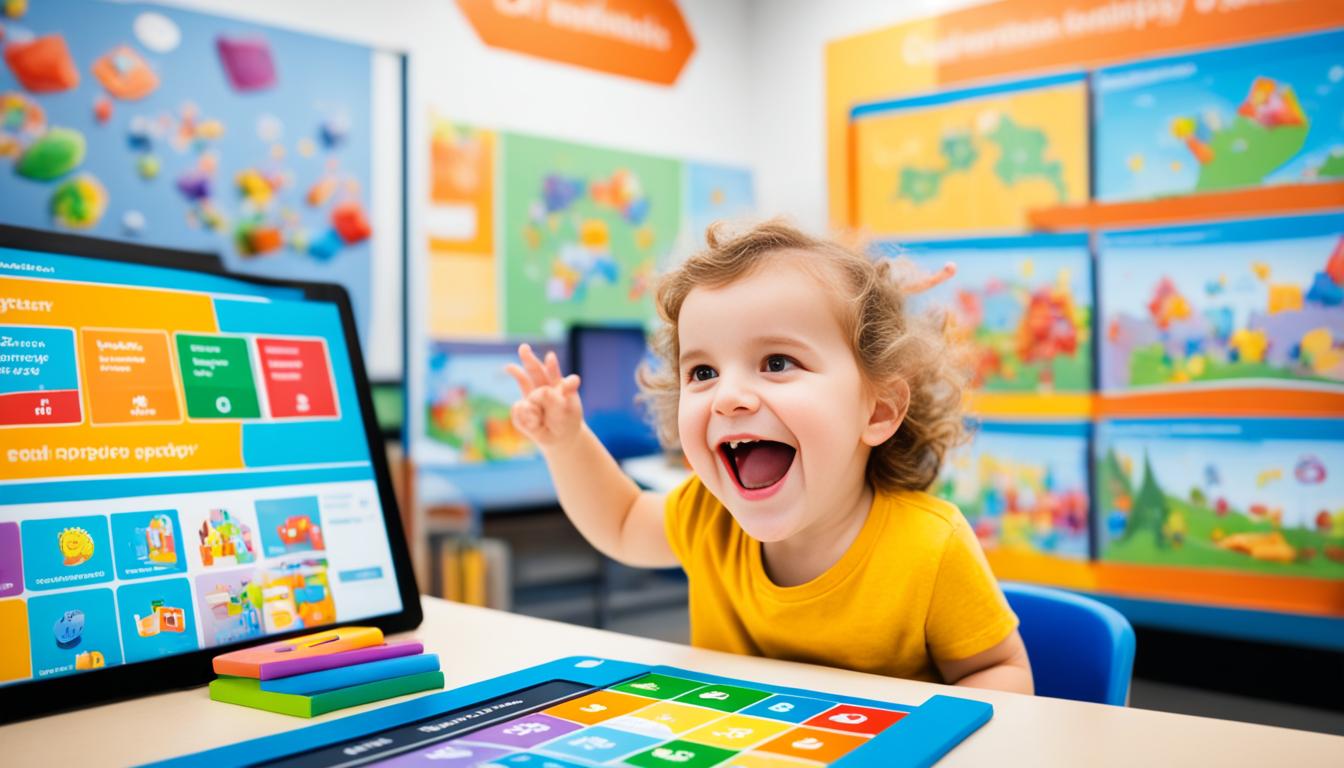Tracking your baby’s speech milestones is crucial for monitoring their language development. From their first words around their first birthday to forming complex questions by 4-5 years old, each stage is significant. Signs such as limited babbling at 12-15 months or difficulty with word formation could indicate delays. These delays may be caused by expressive language delay or hearing loss. Early intervention, like therapy from speech-language pathologists, is necessary. By keeping an eye on these stages and seeking professional help promptly, you can help your child progress. It’s important to celebrate even small improvements and remain consistent in order to make a big impact on your baby’s language journey.
Key Takeaways
- Monitor early babbling, first words around 1 year, plurals by 1, 'ing' words at 3-4, and complex questions at 4-5.
- Recognize signs of delay like lack of babbling, consonant use, or word formation difficulties.
- Seek evaluation for delays like expressive language delay, hearing loss, or disorders promptly.
- Early intervention by speech therapists crucial for addressing delays and ensuring progress.
- Engage in speech therapy, provide a language-rich environment, and celebrate milestones to support speech development.
Age of Speech Development
By their first birthday, babies typically start developing their first words, marking a significant milestone in their speech progression. This period is filled with exciting developmental milestones as your little one begins to navigate the world of language.
From those early cries, smiles, and gestures to the adorable babbling sounds, your baby is laying the foundation for expressive and receptive language skills.
During the first year of life, infants progress rapidly in their language development milestones. They move from basic vocalizations to forming simple words and understanding basic commands.
As a parent, you'll witness firsthand how exposure to speech, sights, and sounds in the environment plays an important role in shaping your child's speech development. It's truly remarkable to see how your baby goes from cooing to saying those first precious words that melt your heart.
Celebrate each step in this journey as your little one reaches new expressive and receptive language milestones.
Stages of Speech Progression

Understanding the stages of speech progression is essential for tracking your child's language development milestones. In the pre-language stage (birth to 5 months), babies communicate through smiles, cries, and coos.
By around 1 year old, children typically utter their first word and start using plurals, pronouns, and prepositions. As they reach 3-4 years old, kids begin incorporating 'ing' words and show improved speech clarity, especially with strangers.
At 4-5 years, speech clarity generally improves further, and children start comprehending complex 'why' questions. While there's variation in individual milestone achievement, certain speech milestones are expected at different ages during early childhood.
Observing these developmental stages can help you track your child's progress as they reach each new stage and start putting words together to express themselves more clearly.
Signs of Speech Delay
If your child isn't babbling by 12-15 months, showing limited use of vowels and consonants by 12-24 months, or struggling with understanding commands and forming sentences, these could be signs of speech delay.
Early intervention strategies can help address these challenges, so seeking professional advice is vital for proper evaluation and support.
Warning Signs to Watch
Importantly, recognizing warning signs of speech delay is essential for early intervention and support in young children's language development. Here are some key warning signs to watch for:
- Lack of Babbling: If your child isn't babbling by 12-15 months, it could indicate a speech delay.
- Limited Use of Vowels and Consonants: Difficulty using vowels and consonants between 12-24 months may suggest a delay in speech development.
- Difficulty Understanding and Forming Words: Trouble understanding commands, lack of words, and forming sentences could be signs of a speech delay.
- Underlying Causes: Expressive language delay can be caused by issues like hearing loss, oral-motor problems, or speech disorders. Additionally, developmental challenges such as ASD, social communication disorder, or intellectual disability may contribute to speech delays.
Being aware of these warning signs can help you identify potential speech delays early on, allowing for timely intervention and support for your child's language development.
Early Intervention Strategies
To effectively address signs of speech delay in young children, early intervention strategies play an essential role in supporting their language development. Speech delays, such as lack of babbling or struggles with forming sentences, can benefit from early intervention by speech-language pathologists (SLPs). These professionals are trained to evaluate and provide targeted therapy to help children overcome speech delays.
By engaging in early intervention, children with speech delays can receive the necessary support to improve their speech production, articulation, vocabulary, and sentence construction skills. It's important for parents to seek guidance from SLPs to create individualized strategies tailored to their child's specific needs.
Research shows that with timely intervention, the majority of late talkers catch up with their peers, highlighting the effectiveness of early support in addressing speech delays. If you notice any signs of speech delay in your child, reaching out to a speech-language pathologist for early intervention can make a significant difference in their language development.
Seeking Professional Advice
Seeking professional advice is essential when you notice signs of speech delay in your child, such as limited babbling or difficulty forming sentences. It's important to be proactive in addressing any concerns about your child's speech development.
Here are some key reasons why seeking professional advice is important:
- Early Intervention: Early evaluation and intervention by speech therapists can greatly improve speech delays in children.
- Parental Awareness: Parents play an important role in recognizing signs of speech delay and taking the necessary steps to support their child's language development.
- Speech Delay Impact: Speech delays can have various causes, ranging from hearing loss to developmental challenges, highlighting the importance of professional evaluation.
- Proper Language Development: Timely professional advice can make sure that children receive the necessary support to achieve proper language development and catch up with their peers.
Common Causes of Delay

Several factors can contribute to speech delay in babies and young children. Common causes of speech delay include expressive language delay, hearing loss, oral-motor problems, and speech disorders. Children with developmental challenges such as Autism Spectrum Disorder (ASD), social communication disorder, or intellectual disability may also experience language delays. It's important to note that early evaluation and intervention by speech therapists play a vital role in addressing and managing speech delays effectively.
Signs of speech delay can include the lack of babbling by 12-15 months, limited use of vowels and consonants by 12-24 months, and difficulty with understanding commands.
While speech delay in early childhood is common, the majority of late bloomers can catch up with their peers with the help of early intervention. If you notice any of these signs or suspect speech delay in your child, seeking professional advice and intervention promptly is recommended to support their speech development.
Temporary Nature of Delay

Speech delays in children often prove to be temporary, with many late bloomers catching up with their peers over time. It's essential for parents to understand that temporary speech delays are common and can often be overcome with the right interventions.
Here are some key points to bear in mind:
- Temporary Speech Delays: Many children experience temporary speech delays, but with appropriate support and intervention, they can make significant progress.
- Early Intervention: Early identification and intervention are pivotal in helping children with speech delays. Seeking help as soon as an issue is noticed can lead to better outcomes.
- Individualized Speech Therapy: Children with temporary speech delays can benefit greatly from individualized speech therapy tailored to their specific needs. This personalized approach can address their unique challenges effectively.
- Parental Role: Parents play an essential role in monitoring and addressing temporary speech delays in their children. Being proactive and seeking professional guidance can make a significant difference in their child's progress.
Therapy for Delayed Speech

With the help of delayed speech therapy, children can work towards catching up with their peers in language development. Speech-language pathologists (SLPs) play an important role in providing individualized therapy plans to address delayed speech in children. These therapy sessions focus on improving speech production, articulation, vocabulary, and sentence construction. SLPs utilize fun and creative strategies to stimulate language improvement in children, making the sessions engaging and effective.
Therapists emphasize early intervention to address expressive language delays effectively. By starting therapy early, children have a better chance of developing their language skills and catching up with their peers. The tailored approach of speech therapy ensures that each child receives the specific support they need to enhance their communication abilities.
If you notice delayed speech in your child, seeking the expertise of a speech-language pathologist can make a significant difference in their language development journey. The structured therapy sessions and guidance provided by SLPs can help your child progress and thrive in their communication skills.
Supporting Milestone Achievement

To support your baby's milestone achievement, engaging in speech therapy tips and techniques can be beneficial.
Encouraging communication skills through activities like reading, singing, and talking to your child can aid in their language development.
Observing your child's progress closely and seeking early intervention if needed are key steps in fostering their speech milestones.
Speech Therapy Tips
Supporting your child's milestone achievement in speech therapy involves consistent practice and active participation in therapy sessions. Here are some tips to help you make the most out of your child's speech therapy sessions:
- Consistency is Key: Guarantee your child attends all scheduled therapy sessions to maintain progress in achieving speech milestones.
- Practice at Home: Incorporate speech therapy exercises into your daily routine to reinforce what your child learns during therapy sessions.
- Communicate with the Therapist: Stay in touch with your child's speech therapist to track progress, discuss challenges, and seek guidance on how to support language development at home.
- Celebrate Progress: Acknowledge and celebrate even small improvements in your child's speech and language skills to motivate them and maintain a positive attitude towards therapy.
Encouraging Communication Skills
Encouraging babies to communicate involves actively responding to their sounds and gestures to foster interaction. Creating a language-rich environment by talking, reading, and singing to your baby can greatly support the development of their communication skills. Encouraging imitation of sounds and gestures is also beneficial in helping babies learn to communicate effectively. Additionally, engaging in back-and-forth interactions like turn-taking during babbling can enhance your baby's communication abilities. Providing a variety of sensory experiences, such as different textures and sounds, can help stimulate your baby's language development further.
| Tips for Encouraging Communication Skills | ||
|---|---|---|
| 1. Respond Actively | 2. Provide a Language-Rich Environment | 3. Encourage Imitation of Sounds |
| Acknowledge your baby's sounds and gestures promptly. | Talk, read, and sing to your baby regularly. | Model making sounds and gestures for your baby to copy. |
| 4. Engage in Turn-Taking | 5. Offer Sensory Experiences | |
| Take turns babbling with your baby. | Introduce different textures and sounds to your baby. |
Frequently Asked Questions
Did the CDC Take Crawling off of Milestones?
No, the CDC did not remove crawling from milestones. It's considered essential for developing coordination and strength in babies. Some infants skip crawling and go straight to walking, which is normal too. Milestones vary among children.
What Are the New CDC Guidelines for Speech Development?
You'll find the new CDC guidelines for speech development helpful. They focus on specific skills children should reach at certain ages, rather than averages. This approach promotes early intervention for speech delays and supports parents better.
How Can I Tell if My Child's Speech and Language Development Is on Track?
To tell if your child's speech is on track, listen for first words by age 1. Pay attention to babbling evolving from cries. Use of plurals, pronouns, and prepositions by 5 months is normal. Trust your instincts and seek help if needed.
Why Did the CDC Revise Their Developmental Milestones?
To catch any hiccups in growth faster, the CDC tweaked milestones, making them more precise and reflecting kids' individual paces. By lowering language standards, they push for quicker intervention. Pros find some bits puzzling.
Conclusion
So there you have it, folks! Remember, when it comes to tracking your baby's speech milestones, knowledge is power. Keep an eye out for any signs of delay, but don't stress too much – sometimes a little patience is all it takes.
And hey, Rome wasn't built in a day, right? Just keep supporting your little one along the way and celebrate each milestone achieved. Happy parenting!










